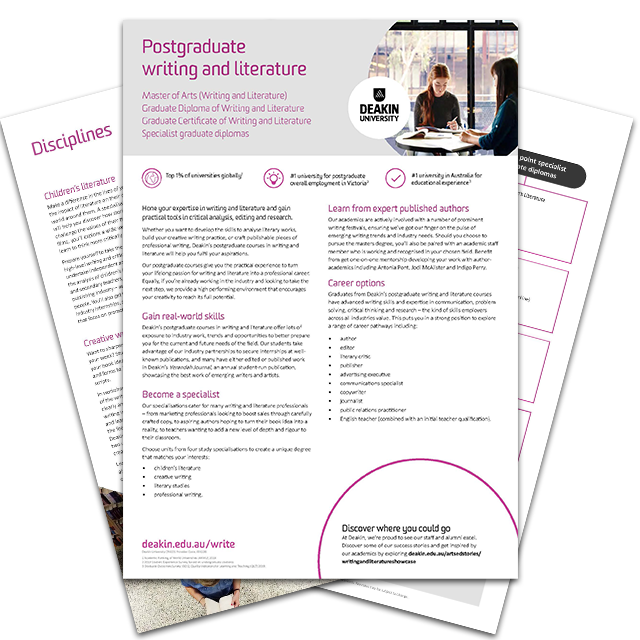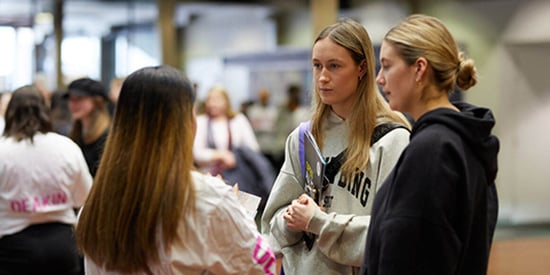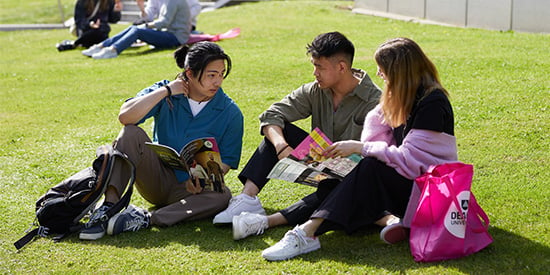Key facts
Duration
This course is 1 year full-time or part-time equivalent duration.
Locations
Key dates
Direct applications to Deakin for Trimester 2 2024 close 23 June 2024
Direct applications to Deakin for Trimester 3 2024 close 27 October 2024
Current Deakin Students
To access your official course details for the year you started your degree, please visit the handbook
Course overview
The Graduate Diploma of Writing and Literature is designed to balance theoretical understandings with practical skills development. By providing a cross-disciplinary alternative, the Graduate Diploma of Writing and Literature provides students with the opportunity to draw on the extensive range of units available across a suite of specialisations.
The Graduate Diploma of Writing and Literature offers a cross-disciplinary foundation in Writing and Literature. Students have the opportunity to choose from an extensive range of units across specialisations in Children’s Literature, Creative Writing, Literary Studies and Professional Writing. The course provides specialised knowledge of critical and creative practices and ways of understanding writing, reading and preparing texts for publication as a cross-disciplinary activity. The course is designed for people with professional or personal interests in writing and literature who are seeking further professional qualifications while working.
Read MoreCourse information
- Award granted
- Graduate Diploma of Writing and Literature
- Year
2017 course information
- Deakin code
- A664
- CRICOS code?
- 083988G Burwood (Melbourne)
- Level
- Postgraduate (Graduate Certificate and Graduate Diploma)
- Approval status
- This course is approved by the University under the Higher Education Standards Framework.
- Australian Qualifications Framework (AQF) recognition
The award conferred upon completion is recognised in the Australian Qualifications Framework at Level 8.
Course structure
To qualify for the award of the Graduate Diploma of Writing and Literature a student must successfully complete 8 credit points of study comprising of:
- 2 credit points of core units
- 2 credit points of Writing units
- 2 credit points of Literature units
- 2 credit points of electives chosen from units within the specialisations of the Master of Arts (Writing and Literature) or Master of Communication
Core Units
Electives
2 credit points of electives chosen from units within the specialisations of the Master of Arts (Writing and Literature) or Master of Communication
Writing & Literature Units
Writing units
Literature units
Intakes by location
The availability of a course varies across locations and intakes. This means that a course offered in Trimester 1 may not be offered in the same location for Trimester 2 or 3. Check each intake for up-to-date information on when and where you can commence your studies.
Trimester 1 - March
- Start date: March
- Available at:
- Burwood (Melbourne)
- Cloud Campus
Trimester 2 - July
- Start date: July
- Available at:
- Burwood (Melbourne)
- Cloud Campus
Trimester 3 - November
- Start date: November
- Available at:
- Burwood (Melbourne)
- Cloud Campus

Take the next step to a brighter future
Kickstart your career growth. We'll prepare you for the career you've always wanted.
Download course guideEntry requirements
Recognition of prior learning
The University aims to provide students with as much credit as possible for approved prior study or informal learning which exceeds the normal entrance requirements for the course and is within the constraints of the course regulations. Students are required to complete a minimum of one-third of the course at Deakin University, or four credit points, whichever is the greater. In the case of certificates, including graduate certificates, a minimum of two credit points within the course must be completed at Deakin.
You can also refer to the Credit for Prior Learning System which outlines the credit that may be granted towards a Deakin University degree and how to apply for credit.
Fees and scholarships
Fee information
Learn more about fees and your options for paying.
The tuition fees you pay will depend on the type of fee place you hold.
- If you are enrolled in a Commonwealth supported place, your tuition fees are calculated depending on the units you choose.
- If you are enrolled in a full fee paying place, your tuition fees are calculated depending on the course you choose.
In both cases, the ‘Estimated tuition fee’ is provided as a guide only based on a typical enrolment of students completing the first year of this course. The cost will vary depending on the units you choose, your study load, the length of your course and any approved Credit for Prior Learning you have.
Each unit you enrol in has a credit point value. The ‘Estimated tuition fee’ is calculated by adding together 8 credit points of a typical combination of units for that course. Eight credit points is used as it represents a typical full-time enrolment load for a year.
You can find the credit point value of each unit under the Unit Description by searching for the unit in the Handbook.
Learn more about fees and available payment options.
FEE-HELP calculator
What is FEE-HELP?
FEE-HELP loans cover up to 100% of tuition fees for eligible students. By taking out a FEE-HELP loan, the government pays your tuition fees directly to Deakin, and the balance is repaid from your employment income - but only once you're earning over $51,550.
Please note: fees shown by the calculator are indicative only and based on 2024 rates. Actual fees may vary. We advise confirming fees with Prospective Student Enquiries prior to enrolment.
Estimate your FEE-HELP
FEE-HELP payments
per pay cycle
Take-home pay
after FEE-HELP and tax
per pay cycle
Your estimated FEE-HELP repayments
- $* is the estimated full cost for a Graduate Diploma of Writing and Literature (8 credit points), based on the 2024 fees.
- is the annual FEE-HELP payment, based on your current salary
- of your current salary be spent on FEE-HELP
*Disclaimer
Deakin University (Deakin):
- gives no warranty and accepts no responsibility for the currency, accuracy or the completeness of the information provided;
- advises users that no reliance should be placed upon on the information provided, and;
- instructs users that they should confirm the actual course fee with Prospective Student Enquiries prior to enrolment.
This tool provides indicative information about the fees that will be payable in respect of courses and subjects offered to prospective students domiciled in Australia during the periods indicated.
Please note that the fees shown by the calculator are indicative only and actual fees may vary. Users are advised to confirm the actual course fee with Prospective Student Enquiries prior to enrolment.
The estimated course fee is based on the tuition fee costs applicable to a domestic full time student commencing the course in Trimester 1 and studying full time for the duration of the course but:
- does not include non-tuition costs that may apply, such as Student Services and Amenities Fees (SSAF);
- does not take into account any scholarships or bursaries awarded to the student (including the 10% Deakin alumni discount);
- assumes the maximum number of units that need to be successfully completed actual number completed may be reduced if recognition of prior learning is granted;
- assumes that no exceptional, or non-typical, circumstances apply to the proposed course of study;
- assumes that the options that the user selects are appropriate for the course of study that they intend to undertake;
- where fees are estimated for future years those fee will be subject to annual increases in accordance with increases in the cost of course delivery.
Scholarship options
A Deakin scholarship might change your life. If you've got something special to offer Deakin – or you just need the financial help to get you here – we may have a scholarship opportunity for you.
Postgraduate bursary
If you’re a Deakin alumnus commencing a postgraduate award course, you may be eligible to receive a 10% reduction per unit on your enrolment fees.
Apply now
Some of our courses have limited places available - for the latest on courses still open for application, visit Courses by trimester.
Create an account in the Deakin Application Portal, start your application, enter personal details, education experience, upload supporting documents and submit. Need help? Play this video, or contact one of our friendly future student advisers on 1800 693 888 or submit an online enquiry.
For more information on the application process and closing dates, see the How to apply webpage. If you're still having problems, please contact us for assistance.
Entry pathways
Alternative exits
- Graduate Certificate of Writing and Literature (A535)
Contact information
Arts and Education Student Services and Enrolment Enquiries
Burwood (Melbourne)
Tel 03 9246 8100
artsed@deakin.edu.au
Cloud (online)
Tel 03 5227 1359
artsed@deakin.edu.au
Careers
Career outcomes
Graduates of this course will find employment opportunities in a broad range of organisations or will be able to pursue freelance or self-employment opportunities. The course provides professional development opportunities for those already employed in publishing, education, library services as well as published authors. Throughout the course, students will be exposed, not just to knowledge of writing and literature, but also to practices and ways of understanding writing as a cross-disciplinary activity which intersects with other creative and communication fields in digital, promotional and multimedia landscapes.
For more information go to My Course My Career
Course learning outcomes
Deakin's graduate learning outcomes describe the knowledge and capabilities graduates can demonstrate at the completion of their course. These outcomes mean that regardless of the Deakin course you undertake, you can rest assured your degree will teach you the skills and professional attributes that employers value. They'll set you up to learn and work effectively in the future.
| Deakin Graduate Learning Outcomes | Course Learning Outcomes |
| Discipline specific knowledge and capabilities | Acquire specialised knowledge of various aspects of writing and literature in particular the interplay between the study of literature and the production of effective creative and professional writing and specialised skills. Apply this knowledge through independent critical thinking, sophisticated practice, and the ability to communicate ideas effectively. |
| Communication | Communicate through writing that is technically proficient and demonstrates awareness of, or ability to extend, established writing conventions to produce works that communicate complex ideas effectively using suitable written forms and specialised techniques. |
| Digital literacy | Employ a range of generic and specialised industry digital technologies for the research, production and presentation of texts, including technologies for the innovative generation or dissemination of complex ideas and works, or those required in various specialised professional contexts. |
| Critical thinking | Demonstrate specialised competencies in the production of texts and discourses informed by rigorous research, close reading, critical thinking and analysis, and by selecting and applying the appropriate writing forms and conventions to provide solutions to complex problems or specialised writing briefs. |
| Problem solving | Analyse and respond to editorial or publishing briefs or opportunities by employing specialised creative and professional writing or communication strategies to identify, solve or reframe complex aesthetic, theoretical or real-world challenges and limitations. |
| Self-management | Demonstrate personal and professional responsibility for learning through autonomy, accountability and a continued commitment to specialised learning and skill development, as a reflective practitioner in professional scholarly and other contexts |
| Teamwork | Actively participate in and make constructive contributions to processes of creative and critical collaboration within or across disciplines, sharing of peer feedback in writing workshops and online forums, and demonstrate professional and ethical negotiation with collaborators and colleagues. |
| Global citizenship | Demonstrate ethical global citizenship and awareness of cultural diversity and social responsibility when engaging in scholarship and in professional roles and community collaborations. |
| Approved by Faculty Board October 2015 | |




